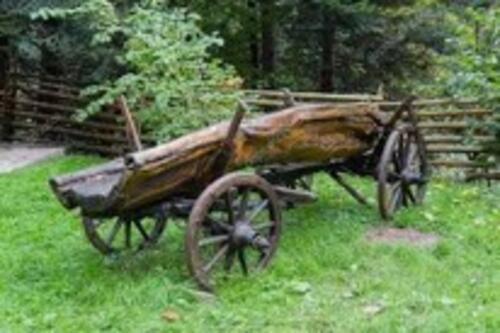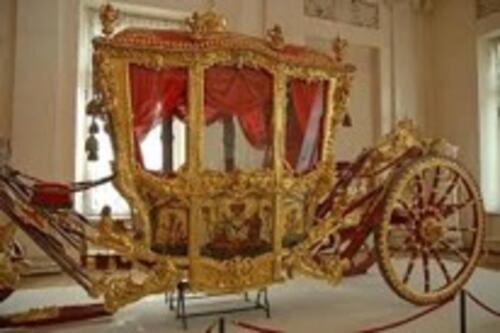Theme #2: Marriage
This excerpt from Glückel’s memoir describes Glückel’s wedding. Glückel’s marriage was arranged, and this passage demonstrates the importance of displays of wealth to the marriage, which was largely an economic arrangement between families and individuals who were not on intimate terms. The passage contrasts life in a large city and a small town as well as shedding light on the marital customs of Glückel’s day.
Trigger: Show the students a picture of the following:
Ask them, what are these? What kinds of differences do you see? What would the ride feel like in each of them? Who or what kind of person would ride in one of these vs. the other?
Excerpt Memoirs of Glückel of Hameln based on Translation by Marvin Lowenthal:
My father had me betrothed when I was a girl of barely twelve, and less than two years later I married. The marriage took place in Hameln, and my parents together with 20 wedding guests brought me there. Fancy coaches did not exist in those days, and we had to hire the peasants to take us as far as Hanover. From Hanover, we waited for my father-in-law to send carriages to pick us up and bring us to the wedding. My mother must have thought that carriages were as plentiful in Hameln as at home in Hamburg. Anyway, she figured that my father-in-law would only send us carriages in which to deliver the bride and her family.
But three days later there appeared 3 or 4 peasant carts! My mother was furious about it, but what could she do? So we plumped ourselves into the little carts and came to Hameln. When we arrived my father-in-law, Joseph Hameln, of blessed memory, a very special man, raised a glass of wine to my mother, but she was still ruffled about having to ride in the peasant carts. My father in law sensed her resentment and said something like, “Now, please don’t be angry; Hameln isn’t Hamburg, we have no coaches, for we are just plain country folk”...Hameln, everyone knows what it is compared with Hamburg: taken by itself, it is a dull shabby hole. And there I was---a carefree child whisked in the flush of youth from my parents, friends, and everyone I knew, from a city like Hamburg to a back country town where there lived only two Jews.
Yet, I thought nothing of it, so much I delighted in the piety of my father-in-law. At three in the morning he rose and put on his Shabbat coat and seated himself close to my bedroom and sing songed his prayers; and then I forgot all about Hamburg.
Students may wish to consider the following questions to reflect in their Glückel Journal:
Questions to Ponder:
- What are some differences between Hameln and Hamburg?
- What does this text tell you about the importance of weddings and marriages in the social and economic life of Glückel’s community?
- In the passage, as Glückel looks back on her wedding she remembers the role her father-in-law played very fondly as well as her mother’s anger that the groom’s family sent peasant carts. Contrast the role of the extended family in today’s modern marriage with that of Glückel’s.
- While Glückel looks back upon her wedding she remembers it positively, do you think that as a 14 year old girl she felt the same way about it as she does when she writes about it in her older years?
For Further Discussion: Show students a clip of a film with a Jewish wedding (for instance, this clip from Fiddler on the Roof or this lego animated film of a modern Hasidic wedding). How does this wedding compare to the one Glückel describes? What do your students think of as a Jewish wedding, and how does Glückel’s description expand their conception?




